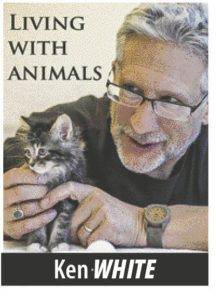I’ve written before about animals’ languages (whales’ song, bees’ dance, that sort of thing) but let’s turn this time to how animals feature in our own language. The many animal-related sayings, clichés and expressions: where do they come from, and what do they say about our relationships with animals…?
While my dog’s life (Lola, the world’s most perfect puppy) is pretty great, and I imagine you’d say the same about your own, “it’s a dog’s life” means quite the opposite. The expression dates back to the 16th century and it inferred not only an unhappy existence but, specifically, one of miserable subservience. As for the hangover cure known as “hair of the dog,” this traces back to the ancient folk medicine prescription of “like cures like”, and is not exactly a reliable or healthy approach! “Cat got your tongue” originally (early 1800s) was used to taunt a young child caught in the act of some mischief or wrongdoing who, despite the irrefutable evidence, was unwilling to admit to it; today the expression is more generally used for someone too shy to talk. The original source, however, is enough to turn any of us speechless, derived from the practice of cutting out the tongues of blasphemers and feeding them to cats.
Perhaps simply because they are unfamiliar, I enjoy those animal clichés heard in other parts of the world. “If you marry a monkey for his wealth, the money goes and the monkey remains as is” and “cross the river in a crowd and the crocodile won’t eat you” are two I heard while visiting Tanzania. Two reportedly common expressions heard in Mexico qualify quite well, I think: rather than getting mad, the furious individual turns “into the big goat,” while a person found daydreaming is said to be “pondering the crab’s immortality.”
Sayings like “to beat a dead horse” (so angry you won’t stop even after it’s too late) and “be the guinea pig” (a sadly common test subject in labs) really don’t require much explanation, but perhaps we can consider alternatives that might better reflect how we actually think of animals. After all, I guess it goes without saying that I am a big fan of “feeding two birds with one scone.”

